Analysis on Fruit Ripening Process and Quality Difference of Cabernet Sauvignon at the Eastern Foot of Helan Mountain
-
摘要: 在贺兰山东麓选取八个赤霞珠葡萄园,通过转色至采收果实品质变化的监测,分析比较不同地区赤霞珠葡萄果实成熟进程及采收期品质差异。结果表明,赤霞珠葡萄成熟过程中果实还原糖含量由49.66 g/L增加至231.85 g/L,可滴定酸含量由33.51 g/L降至7.44 g/L。果皮总酚由28.78 mg/g上升至37.79 mg/g,单宁由5.83 mg/g上升至8.63 mg/g,两者总体呈上升趋势,在后期有一定幅度回落,且变化趋势相吻合。花色苷含量由0.098 mg/g增加至1.40 mg/g,整体呈现上升趋势;黄烷醇含量由1.92 mg/g降至1.32 mg/g,整体呈现下降趋势;两者前期上升或下降较快,后期呈波动变化。果实采收期美御果实还原糖含量最高(257.42 g/L),玉泉营、黄羊滩果实糖含量(小于210 g/L)显著低于其他地区(P<0.05);黄羊滩果实可滴定酸含量偏高,达10.08 g/L,美御、二基地果实酸含量低于6 g/L;御马果皮总酚含量最高(43.76 mg/g),园林场果皮总酚含量最低(32.15 mg/g);御马果皮单宁含量最高,接近10 mg/g,御马和金沙果皮花色苷含量显著高于其他地区(P<0.05)。果实成熟过程中,御马、二基地果皮黄烷醇含量较高,玉泉营、园林场黄烷醇含量较低。成熟顺序依次为:观兰—美御—御马—金沙和二基地—玉泉营和园林场—黄羊滩。采用主成分分析对不同地区赤霞珠葡萄果实品质进行比较分析,御马基地赤霞珠果皮酚类物质含量丰富,糖酸适宜,果实品质最好,其次是金沙基地。本研究结果为宁夏贺兰山东麓选择赤霞珠葡萄最佳种植区以及各产区判断采收时间提供数据支持。Abstract: Based on the monitoring of fruit quality changes from the veraison period to harvest in eight Cabernet Sauvignon vineyards at the eastern foot of Helan Mountain, the fruit development process and quality differences at harvest time of Cabernet Sauvignon in different regions were analyzed and compared. The results showed that the reducing sugar content increased from 49.66 g/L to 231.85 g/L, and the titratable acid content decreased from 33.51 g/L to 7.44 g/L during the ripening process of Cabernet Sauvignon. The total phenolics and tannins in the pericarp increased from 28.78 mg/g to 37.79 mg/g and 5.83 mg/g to 8.63 mg/g, respectively, and they showed an upward trend in general, but decreased to a certain extent in the later stage, and the change trend was consistent. The anthocyanins content increased from 0.098 mg/g to 1.40 mg/g, showing an upward trend, and the flavanol content decreased from 1.92 mg/g to 1.32 mg/g, showing a downward trend generally. Both of them rose or fell rapidly in the early stage and fluctuated in the later stage. The reducing sugar content of fruit in Meiyu was the highest (257.42 g/L), and the sugar content of fruit in Yuquanying and Huangyangtan (less than 210 g/L) was significantly lower than that in other areas (P<0.05); the titratable acid content of fruit in Huangyangtan was high, up to 10.08 g/L, and the acid content of fruit in Meiyu and the Erjidi was lower than 6 g/L; the total phenol content of pericarp in Yuma was the highest (43.76 mg/g), and that in Yuanlinchang was the lowest (32.15 mg/g); the tannin content of pericarp in Yuma was the highest, close to 10 mg/g, the anthocyanin content of pericarp in Yuma and Jinsha was significantly higher than that in other areas (P<0.05). In the process of fruit ripening, the flavanol content of peel in Yuma and Erjidi was higher, and that in Yuquanying and Yuanlinchang farm was lower.The maturation sequence was as follows: Guanlan-Meiyu-Yuma-Jinsha and Erjidi-Yuquanying and Yuanlinchang-Huangyangtan. The grape quality of Cabernet Sauvignon from different regions was analyzed by principal component analysis, the fruit quality of Cabernet Sauvignon in Yuma plant base was the best, with rich phenolic substances and suitable sugar and acid, followed by Jinsha plant base. The results of this study provide data support for selecting the best planting area of Cabernet Sauvignon grape and judging the harvest time in each region at the eastern foot of Helan Mountain, Ningxia.
-
葡萄酒的质量以葡萄原料的品质为基础,因此世界各国都很重视葡萄原料质量的提高,从而得到风味物质相互协调的高品质葡萄酒[1]。酿酒葡萄的品质与葡萄所处种植区域密切相关,不同产区由于土壤、气候和形成的栽培技术等构成风土的各因素的差异,都会对葡萄品质及葡萄酒风格产生极大的影响[2-7],为品种选择最佳的种植区是提高葡萄产品质量的重要方面。苏雅等[8]研究了环渤海湾三大产区玫瑰香葡萄的果实品质的差异性,天津地区玫瑰香葡萄品质优于河北和山东地区,酚类物质相对丰富,山东地区果实品质较差。李玉梅等[9]对甘肃兰州、武威和张掖3个产区的美乐和蛇龙珠果实品质进行了综合评价,张掖比兰州和武威更加适合栽植美乐和蛇龙珠葡萄。朱晓宝[10]研究表明,在秦皇岛市的抚宁区、昌黎县和卢龙县三个小产区中,赤霞珠在卢龙县香格里拉种植园表现优异,品质明显高于其他产区,而马瑟兰适合在抚宁区种植。王锐等[11]研究表明,贺兰山东麓产区3种典型土壤中,风沙土(以玉泉营为代表)所产酿酒葡萄果实糖分、糖酸比和花色苷含量最高,灰钙土(以青铜峡为代表)所产葡萄总酚和单宁含量高,灌淤土(芦花台为代表)所产葡萄果实酸度偏高,葡萄各品质指标均有所降低。
葡萄是宁夏优势特色产业之一,截至2018年,宁夏酿酒葡萄栽培面积达3.8万hm2,占全国总面积的1/4左右[12]。随着葡萄酒产业的发展,宁夏贺兰山东麓酿酒葡萄栽培区域进一步延伸,初步形成了以镇北堡为核心的银川产区,以甘城子为核心的青铜峡产区,以中圈塘为核心的红寺堡产区,以玉泉营、黄羊滩为核心的永宁产区,以金山为核心的贺兰产区[13]。不同小产区的风土条件等导致同一酿酒葡萄品种果实品质差异较大。本试验以宁夏酿酒葡萄栽培面积最大的品种赤霞珠为试材, 选取贺兰山东麓不同地区盛果期的赤霞珠葡萄园,通过果实转色至采收还原糖、可滴定酸含量以及总酚、花色苷、单宁等酚类物质含量的监测,分析比较不同地区赤霞珠葡萄果实成熟进程及采收期品质差异,为赤霞珠葡萄最佳种植区的选择提供理论依据。
1. 材料与方法
1.1 材料与仪器
赤霞珠葡萄园 在贺兰山东麓不同小产区共选取八个试验点,选择管理水平中等偏上,处于盛果期的赤霞珠葡萄园,每个试验园标记30株长势一致的植株用于采样。八个试验点分别位于:贺兰金山观兰基地、贺兰金山美御基地、银川市西夏区芦花台园林场基地、永宁县金沙基地、永宁县黄羊滩农场、永宁县玉泉营农场、青铜峡甘城子西鸽二基地、青铜峡甘城子御马基地,其中贺兰金山观兰基地和美御基地建立时间相对较晚,采用厂字形架形,其他六个基地采用倾斜龙干形;没食子酸、(+)-儿茶素、对二甲氨基肉桂醛(p-dimethylaminocinnamaldehyde,p-DMACA) 美国Sigma公司;甲醇 上海广诺化学科技有限公司;福林酚、福林丹尼斯 上海瑞楚生物科技有限公司;氢氧化钠、盐酸、碳酸钠、醋酸钠、硫酸铜、酒石酸钾钠、无水乙醇 天津市大茂化学试剂厂;所有试剂均为分析纯。
1580R高速冷冻台式离心机 基因有限公司;UV2600紫外分光光度计 上海天美科学仪器有限公司;ME204分析天平 梅特勒-托利多国际贸易(上海)有限公司;KQ-500DE型超声波清洗器 昆山市超声仪器有限公司。
1.2 实验方法
1.2.1 样品采集与处理
试验于2019年进行,在9月10日至9月20日,每个试验园在距标记植株根部50 cm处,采集0~50 cm土样,共采集8~10 处混匀,用于测定土壤理化性质指标。从果实转色期8月1日开始至采收期(根据各试验点正常管理的采收时间,观兰、美御、玉泉营9月25日采收,其他5个试验园9月29日采收),每7 d左右采集一次果样,采样时厂字形从树行两侧结果带随机取样,倾斜龙干形取植株两侧中部果实,每试验点取10穗葡萄。采样样品当天运回实验室,每果穗从不同部位取果粒15粒,共计150粒果,挤成果汁用于测定还原糖、可滴定酸含量,同时从果穗不同部位剪下果粒共50粒混匀,剥下果皮用液氮冷冻后存放在−80 ℃超低温冰箱,用于测定果皮酚类物质含量。
1.2.2 测定方法
土壤样品送至宁夏智联检测科学技术研究所,检测土壤pH、全盐、有机质、速效氮、速效钾、速效磷及机械组成。
果实还原糖含量测定采用斐林试剂滴定法(以葡萄糖计)[14];可滴定酸含量测定采用NaOH滴定法(以酒石酸计)[15];果皮总酚含量测定采用福林-肖卡法(以没食子酸计)[16];单宁含量测定采用福林-丹尼斯法(以单宁酸计)[17];花色苷含量测定采用pH示差法(以二甲基花翠素-3-葡萄糖苷计)[18];总黄烷醇含量测定采用p-DMACA-盐酸法(以儿茶素计)[19]。
1.3 数据处理
采用Excel2016 和SPSS 20.0软件进行数据处理与分析,数据以平均值±标准差表示。
2. 结果与分析
2.1 不同地区土壤理化性质
从表1可以看出,八个样点的土壤pH在8.33~8.94,均为碱性,土壤全盐含量园林场远高于其他地区,为其他地区的1.5~3.75倍,金沙土壤全盐含量最低。根据全国第二次土壤普查分级标准[20],不同样点的土壤有机质含量普遍较低,土壤速效氮含量处于五级至六级水平。除金沙土壤速效磷含量在四级水平,其他样点速效磷在土壤中积累较多,土壤速效磷含量达到二级或三级水平。各样点土壤速效钾比较丰富,含量达到了二级至四级。总体来看,土壤速效磷、速效钾含量较为丰富,有机质、速效氮的含量偏低。八个样点中园林场、美御土壤肥力相对较高,金沙由于是沙土,保肥性差,养分含量最低。
表 1 土壤理化性质Table 1. Physical and chemical properties of soil采样
地点pH 全盐(g/kg) 有机质(g/kg) 速效氮(mg/kg) 速效磷(mg/kg) 速效钾(mg/kg) 机械组成 观 兰 8.94±0.08a 0.30±0.04cd 9.10±1.84b 17.3±4.5d 15.5±3.0bc 71±8de 砂质壤土 美 御 8.33±0.11d 0.40±0.08bc 14.05±2.05a 58.3±7.1a 14.6±2.3bc 200±20a 砂质壤土 园林场 8.35±0.07cd 0.75±0.07a 9.49±2.12b 45.0±2.8b 27.4±5.1a 159±18b 壤 土 金 沙 8.66±0.08b 0.20±0.06d 2.04±0.35c 7.0±2.3e 6.8±1.1c 55±7e 砂 土 玉泉营 8.62±0.17bc 0.40±0.03bc 7.20±1.70b 26.3±3.4cd 35.4±4.8a 102±10cd 砂质壤土 黄羊滩 8.50±0.07bcd 0.40±0.02bc 7.52±2.12b 23.7±5.4cd 16.2±2.6b 84±11de 砂质壤土 二基地 8.50±0.14bcd 0.50±0.04b 5.65±2.32bc 29.0±4.2c 27.9±5.5a 120±14c 砂质壤土 御 马 8.60±0.14bcd 0.30±0.08cd 6.68±1.27b 23.9±4.1cd 34.4±3.7a 125±15c 砂质壤土 注:同列不同小写字母表示差异显著(P<0.05)。 2.2 不同地区赤霞珠葡萄成熟过程中品质变化
2.2.1 不同地区赤霞珠葡萄果实糖、酸含量的变化
赤霞珠葡萄成熟过程中还原糖含量由49.66 g/L增加至231.85 g/L,总体呈上升趋势。8月1日开始监测时,不同地区果实还原糖含量差异较大,从高到低依次为:观兰>美御>金沙>二基地>黄羊滩>御马>玉泉营>园林场,观兰和美御果实糖含量分别达到最后采收期的58.02%和39.55%,园林场和玉泉营果实含糖量不足采收期的10%(如图1所示)。8月1日至8月15日果实含糖量快速上升,平均日积累量在4.0 g/L以上,二基地和御马果实含糖量日平均增长最快。8月15日至9月5日果实含糖量上升趋势变缓,平均日积累量小于3.0 g/L,9月5日至9月25日果实含糖量上升趋势进一步变缓。观兰、美御果实糖的积累远远早于其他地区,一方面由于基地土壤含有较多的石砾,具有较高的积温,另一方面与新建基地采用厂字形架形,结果部位更靠近地面有关。
由图2可知,赤霞珠葡萄成熟过程中可滴定酸含量持续降低,由33.51 g/L降至7.44 g/L。8月1日开始监测时,不同小产区果实酸含量从高到低依次为:金沙>黄羊滩>御马>二基地>玉泉营>园林场>美御>观兰,观兰酸含量低于20 g/L,金沙和黄羊滩果实酸含量接近40 g/L。8月1日至8月15日果实酸含量急速下降,金沙和二基地的果实酸含量降幅最大,其次是御马。8月15日至9月11日果实酸含量下降趋势变缓,9月11日至9月29日果实酸含量趋于平稳。黄羊滩葡萄园由于土壤黏重,通透性比较差,葡萄成熟不彻底,果实酸含量偏高。
2.2.2 不同地区赤霞珠葡萄果皮酚类物质含量的变化
2.2.2.1 赤霞珠果皮总酚含量变化
酚类物质含量是酿酒葡萄萄果实的重要品质指标,决定着葡萄酒的色调、色度、收敛性等感官特性[21]。赤霞珠葡萄成熟过程中总酚含量不断累积,由28.78 mg/g上升至37.79 mg/g,总体呈上升趋势,在后期有一定幅度回落,这与报道的烟台赤霞珠葡萄转色后总酚含量变化规律一致[22]。8月1日开始监测时,不同地区赤霞珠葡萄果皮总酚含量差异较大,观兰葡萄果皮总酚含量最高,其次是二基地、玉泉营、黄羊滩、御马,果皮总酚含量在31.0 mg/g左右,园林场果皮总酚含量最低(如图3所示)。
观兰和美御赤霞珠果皮总酚含量在8月1日至8月9日快速上升,此后上升趋势变缓,在9月11日达最高值,随后回落。御马和二基地赤霞珠葡萄果皮总酚含量在8月1日至8月15日快速增加,此后呈波动状上升,在9月25日达最大值,御马果皮总酚含量有小幅回落,二基地总酚含量下降较大。黄羊滩赤霞珠葡萄果皮总酚含量在整个成熟期间变化趋势比较平缓,没有急速上升或下降的现象,玉泉营赤霞珠葡萄果皮总酚含量在9月11日至9月18日快速上升,其他时间变化趋势平缓。金沙赤霞珠葡萄果皮总酚含量在8月1日至8月9日快速上升,此后上升趋势变缓,在9月25日达最高值,随后回落。园林场赤霞珠葡萄果皮总酚含量在整个成熟期基本低于其他地区。
2.2.2.2 赤霞珠果皮单宁含量变化
赤霞珠葡萄成熟过程中单宁与总酚呈相似的变化趋势,各地区初始单宁含量平均值为5.83 mg/g,前期单宁不断累积,达最大值后有不同幅度回落,最终单宁含量达8.63 mg/g。8月1日开始监测时,观兰和御马葡萄果皮单宁含量较高(7.19、7.12 mg/g),其次是二基地(6.50 mg/g)、玉泉营(5.90 mg/g),园林场果皮单宁含量最低(4.73 mg/g)(如图4所示)。
观兰、美御、金沙、玉泉营、黄羊滩赤霞珠果皮单宁含量在8月1日至8月9日快速上升,平均日积累量在0.19 mg/g以上,这五个地区除观兰果皮单宁含量在9月11日达到最大值后有大幅下降,其他四个地区果皮单宁含量从8月9日至采收变化比较平缓。御马和二基地赤霞珠葡萄果皮单宁含量与总酚含量的变化趋势是一致的。园林场赤霞珠葡萄果皮单宁含量在整个成熟期基本低于其他地区,8月1日~8月15日快速增加,随后上升趋势变缓,8月29日至9月11日出现快速增长期,总体变化与总酚变化相吻合。
2.2.2.3 赤霞珠果皮花色苷含量变化
花色苷是红葡萄酒中主要的呈色物质,与葡萄酒的色调密切相关[23]。从图5可以看出,赤霞珠葡萄成熟过程中花色苷含量由0.098 mg/g增加至1.40 mg/g,整体呈现上升趋势。8月1日开始监测时,观兰葡萄果皮花色苷含量较高为0.583 mg/g ,其次是美御(0.161 mg/g),其他六个地区赤霞珠葡萄果皮花色苷含量在0.003~0.012 mg/g,这与不同地区的土壤、架形等形成的小气候条件不同有密切关系。
8月1日至8月29日果皮花色苷含量快速增加,不同地区在此阶段有一定差异。观兰在8月1日至8月9日,花色苷含量增加最快;园林场、玉泉营、黄羊滩在8月15日至8月29日果皮花色苷增加最快;金沙、二基地、御马8月1日至8月29日花色苷均保持较快的增长。8月29日至采收,花色苷呈波动上升,可能与此阶段出现两次降雨有关[24-25]。
2.2.2.4 赤霞珠果皮黄烷醇含量变化
黄烷醇是葡萄酒中重要的苦味及涩味物质,它可以与花色苷发生反应,稳定葡萄酒颜色[26]。从图6可以看出,赤霞珠葡萄成熟过程中黄烷醇含量由1.92 mg/g降至1.32 mg/g,整体呈现下降趋势。8月1日~8月29日果皮黄烷醇含量快速下降,降低了0.56~0.78 mg/g,8月29日至采收,黄烷醇呈波动下降。整个成熟过程中,御马、二基地果皮黄烷醇含量较高,玉泉营、园林场黄烷醇含量较低。
2.3 不同地区赤霞珠葡萄采收期品质比较
果实采收期品质分析,玉泉营、黄羊滩果实还原糖含量低于210 g/L,显著低于其他地区(P<0.05),金沙、御马果实糖含量在230~240 g/L,二基地、观兰和美御果实糖含量较高,在250 g/L左右。美御、二基地果实可滴定酸含量低于6 g/L,黄羊滩果实酸含量偏高,达10.08 g/L,其他五个地区果实酸含量在6 ~10 g/L,保持在酿酒葡萄适宜的酸度范围内[27-28](如图7所示)。
![]() 图 7 不同地区赤霞珠葡萄采收期糖、酸含量注:不同小写字母表示差异显著(P<0.05),图8同。Figure 7. Reducing sugar and titratable acid content in Cabernet Sauvignon grapes from different regions at harvest time
图 7 不同地区赤霞珠葡萄采收期糖、酸含量注:不同小写字母表示差异显著(P<0.05),图8同。Figure 7. Reducing sugar and titratable acid content in Cabernet Sauvignon grapes from different regions at harvest time如图8所示,御马赤霞珠葡萄果皮总酚含量显著高于其他地区(P<0.05),为43.76 mg/g,其次是金沙(41.76 mg/g),园林场果皮总酚含量最低(32.15 mg/g),其他五个地区果皮总酚含量在36.06~37.58 mg/g。御马果皮单宁含量最高,接近10 mg/g,园林场、玉泉营、观兰果皮单宁含量较低,在7.68~8.22 mg/g,其他四个地区果皮单宁含量在8.46~9.20 mg/g。果皮花色苷含量御马和金沙显著高于其他地区(P<0.05),分别为1.536 mg/g和1.530 mg/g,其次是黄羊滩和二基地。果皮黄烷醇含量玉泉营最低(1.10 mg/g),御马最高(1.48 mg/g)。
对不同地区赤霞珠葡萄果实品质的6个性状指标进行主成分分析,提取了2个主成分,第1主成分贡献率为57.01%,总酚、单宁、花色苷、黄烷醇与主成分1相关性较大,第2主成分贡献率为33.63%,还原糖、可滴定酸与主成分2相关性较大(图9A)。将特征向量和标准化后的数据相乘并加权得到各主成分得分,御马赤霞珠葡萄果皮酚类物质含量高,在主成分1上得分最高;美御果实还原糖含量高、酸含量低,在主成分2上得分最高(图9B)。
综合来看,御马赤霞珠果实品质最好,其次是金沙,黄羊滩、玉泉营、园林场赤霞珠果实品质相对较差(表2),这与各地的土壤质地不同有较大的关系。御马、金沙的土壤土质疏松,具有良好的透气和排水性,有利于葡萄糖分和酚类物质的积累,黄羊滩、园林场土壤土质相对黏重,不利于葡萄的生长发育[29-30]。
表 2 不同地区赤霞珠葡萄主成分得分Table 2. Principal component scores of Cabernet Sauvignon grapes in different regions采样地点 F1 F2 F 御马 3.402 −0.583 1.924 金沙 1.954 −0.343 1.102 美御 0.108 2.081 0.840 二基地 −0.194 1.529 0.445 观兰 −0.958 1.398 −0.084 黄羊滩 0.335 −1.918 −0.501 园林场 −2.545 −0.360 −1.734 玉泉营 −2.101 −1.804 −1.991 3. 结论
在贺兰山东麓不同小产区共选取八个试验点(观兰、美御、园林场、金沙、黄羊滩、玉泉营、二基地、御马),监测了赤霞珠葡萄转色至采收期果实品质变化。赤霞珠葡萄成熟过程中果实还原糖含量逐渐增加,可滴定酸含量持续降低,最后趋于平缓。果皮总酚、单宁不断累积,总体呈上升趋势,在后期有一定幅度回落,两者变化趋势相吻合。花色苷含量整体呈现上升趋势,黄烷醇含量整体呈现下降趋势,前期上升或下降较快,后期波动变化。根据各指标的变化,不同试验点果实成熟顺序:首先是观兰,其次是美御,再次是御马,接着是金沙和二基地,然后是玉泉营和园林场,最后是黄羊滩。对不同地区赤霞珠葡萄果实品质进行比较分析,御马基地赤霞珠果皮酚类物质含量丰富,糖酸适宜,果实品质综合指标更能满足酿造优质葡萄的要求,其次是金沙基地。本研究为宁夏贺兰山东麓地区选择赤霞珠葡萄最佳种植区、生产优质赤霞珠葡萄酒提供理论参考。
-
图 7 不同地区赤霞珠葡萄采收期糖、酸含量
注:不同小写字母表示差异显著(P<0.05),图8同。
Figure 7. Reducing sugar and titratable acid content in Cabernet Sauvignon grapes from different regions at harvest time
表 1 土壤理化性质
Table 1 Physical and chemical properties of soil
采样
地点pH 全盐(g/kg) 有机质(g/kg) 速效氮(mg/kg) 速效磷(mg/kg) 速效钾(mg/kg) 机械组成 观 兰 8.94±0.08a 0.30±0.04cd 9.10±1.84b 17.3±4.5d 15.5±3.0bc 71±8de 砂质壤土 美 御 8.33±0.11d 0.40±0.08bc 14.05±2.05a 58.3±7.1a 14.6±2.3bc 200±20a 砂质壤土 园林场 8.35±0.07cd 0.75±0.07a 9.49±2.12b 45.0±2.8b 27.4±5.1a 159±18b 壤 土 金 沙 8.66±0.08b 0.20±0.06d 2.04±0.35c 7.0±2.3e 6.8±1.1c 55±7e 砂 土 玉泉营 8.62±0.17bc 0.40±0.03bc 7.20±1.70b 26.3±3.4cd 35.4±4.8a 102±10cd 砂质壤土 黄羊滩 8.50±0.07bcd 0.40±0.02bc 7.52±2.12b 23.7±5.4cd 16.2±2.6b 84±11de 砂质壤土 二基地 8.50±0.14bcd 0.50±0.04b 5.65±2.32bc 29.0±4.2c 27.9±5.5a 120±14c 砂质壤土 御 马 8.60±0.14bcd 0.30±0.08cd 6.68±1.27b 23.9±4.1cd 34.4±3.7a 125±15c 砂质壤土 注:同列不同小写字母表示差异显著(P<0.05)。 表 2 不同地区赤霞珠葡萄主成分得分
Table 2 Principal component scores of Cabernet Sauvignon grapes in different regions
采样地点 F1 F2 F 御马 3.402 −0.583 1.924 金沙 1.954 −0.343 1.102 美御 0.108 2.081 0.840 二基地 −0.194 1.529 0.445 观兰 −0.958 1.398 −0.084 黄羊滩 0.335 −1.918 −0.501 园林场 −2.545 −0.360 −1.734 玉泉营 −2.101 −1.804 −1.991 -
[1] 杨馥霞, 张坤, 杨瑞, 等. 酿酒葡萄主要品质形成机理研究进展[J]. 中外葡萄与葡萄酒,2016(3):41−45. [YANG F X, ZHANG K, YANG R, et al. Research progress on main quality formation mechanism of wine grape[J]. Sino-Overseas Grapevine & Wine,2016(3):41−45. [2] 李记明, 姜文广, 于英, 等. 土壤质地对酿酒葡萄和葡萄酒品质的影响[J]. 酿酒科技,2013(7):37−41. [LI J M, JIANG W G, YU Y, et al. Effect of soil texture on the quality of grape and wine[J]. Liquor-Making Science & Technology,2013(7):37−41. [3] YAMANE T, JEONG S T, GOTO-YAMAMOTO N, et a1. Effects of temperature on anthocyanin biosynthesis in grape berry skins[J]. American Journal of Enology and Viticulture,2006,57(1):54−59.
[4] FAILLA O, MARIANI L, BRANCADORO L, et al. Spatial distribution of solar radiation and its effects on vine phenology and grape ripening in an alpine environment[J]. American Journal of Enology & Iticulture,2004,55(2):128−138.
[5] 杨君, 陈黄曌, 李俊楠, 等. 不同叶幕类型对‘赤霞珠’葡萄产量与果实品质的影响[J]. 果树学报,2020,37(2):235−243. [YANG J, CHEN H Z, LI J N, et al. Effects of canopy types on yield and berry quality of‘Cabernet Sauvignon’[J]. Journal of Fruit Science,2020,37(2):235−243. [6] SONG C Z, WANG C, XIE S, et al. Effects of leaf removal and cluster thinning on berry quality of Vitis vinifera cultivars in the region of Weibei dryland in China[J]. Journal of Integrative Agriculture,2018,17(7):1620−1630. doi: 10.1016/S2095-3119(18)61990-2
[7] 李巍. 风土—葡萄与葡萄酒业的精髓[J]. 中外葡萄与葡萄酒,2016(5):150−151,155. [LI W. Terroir - the essence of grape and wine industry[J]. Sino-Overseas Grapevine & Wine,2016(5):150−151,155. [8] 苏雅, 徐雯, 裴毅, 等. 不同地区“玫瑰香”葡萄品质与酚类物质含量差异[J]. 北方园艺,2021(2):23−30. [SU Y, XU W, PEI Y, et al. Differences of quality and phenols content of ‘Muscat Hamburg’ grape in different regions[J]. Northern Horticulture,2021(2):23−30. [9] 李玉梅, 韦霞霞, 李彦彪, 等. ‘美乐’和‘蛇龙珠’葡萄在甘肃不同产区的品质评价[J]. 经济林研究,2020,38(4):152−160. [LI Y M, WEI X X, LI Y B, et al. Quality analysis of ‘Merlot’ and ‘Cabernet Gernischt’ grapes in different producing areas of Gansu Province[J]. Non-wood Forest Research,2020,38(4):152−160. [10] 朱晓宝. 秦皇岛不同小产区赤霞珠、马瑟兰品质特性的研究[D]. 秦皇岛: 河北科技师范学院, 2021. ZHU X B. Study on the quality characteristics of Cabernet Sauvignon and Marselan in different small production areas of Qinhuangdao[D]. Qinhuangdao: Hebei Normal University of Science and Technology, 2021.
[11] 王锐, 李磊, 孙权, 等. 贺兰山东麓典型土壤与酿酒葡萄成熟度及品质的关系[J]. 北方园艺,2016(21):1−6. [WANG R, LI L, SUN Q, et al. Relationship between typical soil and wine grape maturity and quality at Eastern foot of Helan Mountain[J]. Northern Horticulture,2016(21):1−6. [12] 石瑞, 赵润良, 周通, 等. 宁夏现代葡萄产业全产业链道路剖析[J]. 现代农业研究,2019(6):5−8,10. [SHI R, ZHAO R L, ZHOU T, et al. The analysis to industrial chain road of modern grape industry in Ningxia[J]. Modern Agriculture Research,2019(6):5−8,10. doi: 10.3969/j.issn.1674-0653.2019.06.001 [13] 武玉和. 宁夏葡萄产业发展的内外因素浅析[J]. 现代食品,2020(15):50−52,58. [WU Y H. Analysis on internal and external factors of grape industry development in Ningxia[J]. Modern Food,2020(15):50−52,58. [14] 中华人民共和国国家卫生和计划生育委员会. GB 5009.7—2016 食品安全国家标准 食品中还原糖的测定[S]. 北京: 中国标准出版社, 2016. National Health and Family Planning Commission of the People's Republic of China. GB 5009.7-2016 National standard for food safety. Determination of reducing sugar in food [S]. Beijing: China Standards Press, 2016.
[15] 高俊凤. 植物生理学实验指导[M]. 北京: 高等教育出版社, 2006: 199-200 GAO J F. Experimental guidance of plant phy-siology [M]. Beijing: Higher Education Press, 2006: 199-200.
[16] LIANG Z C, CHEN L L, ZHONG G Y, et al. Antioxidant and antiproliferative activities of twenty-four Vitis vinifera grapes[J]. PloS One,2014,9(8):9−10.
[17] 江雨. 中国野生葡萄果实品质评价和主要物质组分研究[D]. 杨凌: 西北农林科技大学, 2016. JIANG Y. The quality evaluation and main components of Chinese wild grape berry [D]. Yangling: Northwest A & F University, 2016.
[18] 翦祎, 韩舜愈, 张波, 等. 单一pH 法、pH 示差法和差减法快速测定干红葡萄酒中总花色苷含量的比较[J]. 食品工业科技,2012,33(23):323−325,423. [JIAN Y, HAN S Y, ZHANG B, et al. Comparison of single pH method, pH-differential method and subtraction method for determining content of anthocyanins from red wine[J]. Science and Technology of Food Industry,2012,33(23):323−325,423. [19] LIU Y X, PAN Q H, YAN G L, et al. Changes of flavan-3-ols with different degrees of polymerization in seeds of ‘Shiraz’, ‘Cabernet Sauvignon’ and ‘Marselan’ grapes after veraison[J]. Molecules,2010,15(11):7763−7774. doi: 10.3390/molecules15117763
[20] 王畅, 山宝琴, 孟姣姣, 等. 延大树木园土壤养分及AM真菌分布研究[J]. 延安大学学报(自然科学版),2016,35(4):95−99. [WANG C, SHAN B Q, MENG J J, et al. Soil nutrient and distribution of AMF in arboretum of Yanan University[J]. Journal of Yanan University(Natural Science Edition),2016,35(4):95−99. [21] PEIXOTO C M, DIAS M I, ALVES M J, et al. Grape pomace as a source of phenolic compounds and diverse bioactive properties[J]. Food Chemistry,2018,253(1):132−138.
[22] 崔文娟, 赵玉平, 田家浩, 等. 烟台产区‘赤霞珠’转色后指标的变化研究[J]. 中国酿造,2018,37(6):131−135. [CUI W J, ZHAO Y P, TIAN J H, et al. Changes in different indexes of Cabernet Sauvignon grape after veraison in Yantai region[J]. China Brewing,2018,37(6):131−135. doi: 10.11882/j.issn.0254-5071.2018.06.025 [23] CORTELLl J M, HALBLEIB M, GALLAGHER A V, et al. Influence of vine vigor on grape (Vitis vinifera L. cv. Pinot Noir) anthocyanins. 1. Anthocyanin concentration and composition in fruit[J]. Journal of Agricultural and Food Chemistry,2007,55(16):6575−6584. doi: 10.1021/jf070195v
[24] 姜琳琳, 王静, 张晓煜, 等. 成熟期降水对贺兰山东麓酿酒葡萄果实品质的影响[J]. 中国农业气象,2020,41(3):156−161. [JIANG L L, WANG J, ZHANG X Y, et al. Rainfall effect on the quality of wine grape during the ripening stage at the eastern foot of Helan Mountain[J]. Chinese Journal of Agrometeorology,2020,41(3):156−161. doi: 10.3969/j.issn.1000-6362.2020.03.004 [25] 杨豫, 陈仁伟, 王静, 等. 赤霞珠葡萄品质成分对成熟期降水过程的响应[J]. 浙江农业科学,2020,61(3):556−560. [YANG Y, CHEN R W, WANG J, et al. Response of Cabernet Sauvignon quality to precipitation process during the mature period[J]. Journal of Zhejiang Agricultural Sciences,2020,61(3):556−560. [26] BENBOUGUERRA N, RICHARD T, SAUCIER C, et al. Voltammetric behavior, flavanol and anthocyanin contents, and antioxidant capacity of grape skins and seeds during ripening (Vitis vinifera var. Merlot, Tannat, and Syrah).[J]. Antioxidants,2020,9(9):800. doi: 10.3390/antiox9090800
[27] 周鹏辉, 李泽福, 李进. 3个白色酿酒葡萄品种在蓬莱不同产区的栽培特性及果实品质对比研究[J]. 山西果树,2016(2):3−6,30. [ZHOU P H, LI Z F, LI J. Comparison of cultivation characteristics and fruit quality of three white wine grape varieties in different regions of Penglai[J]. Shanxi Fruits,2016(2):3−6,30. doi: 10.3969/j.issn.1005-345X.2016.02.002 [28] 李玉鼎, 张光弟, 李欣, 等. 气候变化对贺兰山东麓酿酒葡萄的影响及应对措施[J]. 中外葡萄与葡萄酒,2019(1):38−40,43. [LI Y D, ZHANG G D, LI X, et al. Impact of climate change on wine grapes at the eastern foot of Helan Mountain and countermeasures[J]. Sino-Overseas Grapevine & Wine,2019(1):38−40,43. [29] 刘晶晶. 外源激素和土壤类型对葡萄花色苷及葡萄酒色泽稳定性的影响[D]. 济南: 齐鲁工业大学, 2020. LIU J J. Effects of exogenous hormones and soil type on grape anthocyanin and wine color stability [D]. Jinan: Qilu University of Technology, 2020.
[30] 李文超, 孙盼, 王振平. 不同土壤条件对酿酒葡萄生理及果实品质的影响[J]. 果树学报,2012,29(5):837−842. [LI W C, SUN P, WANG Z P. Effects of different soil condition on physiology and fruit quality of wine grapes[J]. Journal of Fruit Science,2012,29(5):837−842. -
期刊类型引用(4)
1. 李红英,王静,李娜,姜琳琳,杨洋,胡宏远,张晓煜. 贺兰山东麓葡萄园不同方位摘叶对赤霞珠果实品质的影响. 中国农业气象. 2024(01): 23-32 .  百度学术
百度学术
2. 贾永华,马军,许泽华,李百云,侯克峰,李晓龙. 果园生草条件下介导果树适施外源钙剂引起的果实内源激素和品质变化特征. 北方园艺. 2024(07): 1-9 .  百度学术
百度学术
3. 李媛媛,王鲁泉,张栋. 我国葡萄酒产业竞争力提升路径探析. 中外葡萄与葡萄酒. 2022(03): 78-83 .  百度学术
百度学术
4. 任小彤,彭婧,韩晓,王军,何非. 贺兰山东麓产区不同地块酿酒葡萄果实类黄酮物质分析. 中外葡萄与葡萄酒. 2022(06): 32-41 .  百度学术
百度学术
其他类型引用(3)





 下载:
下载:
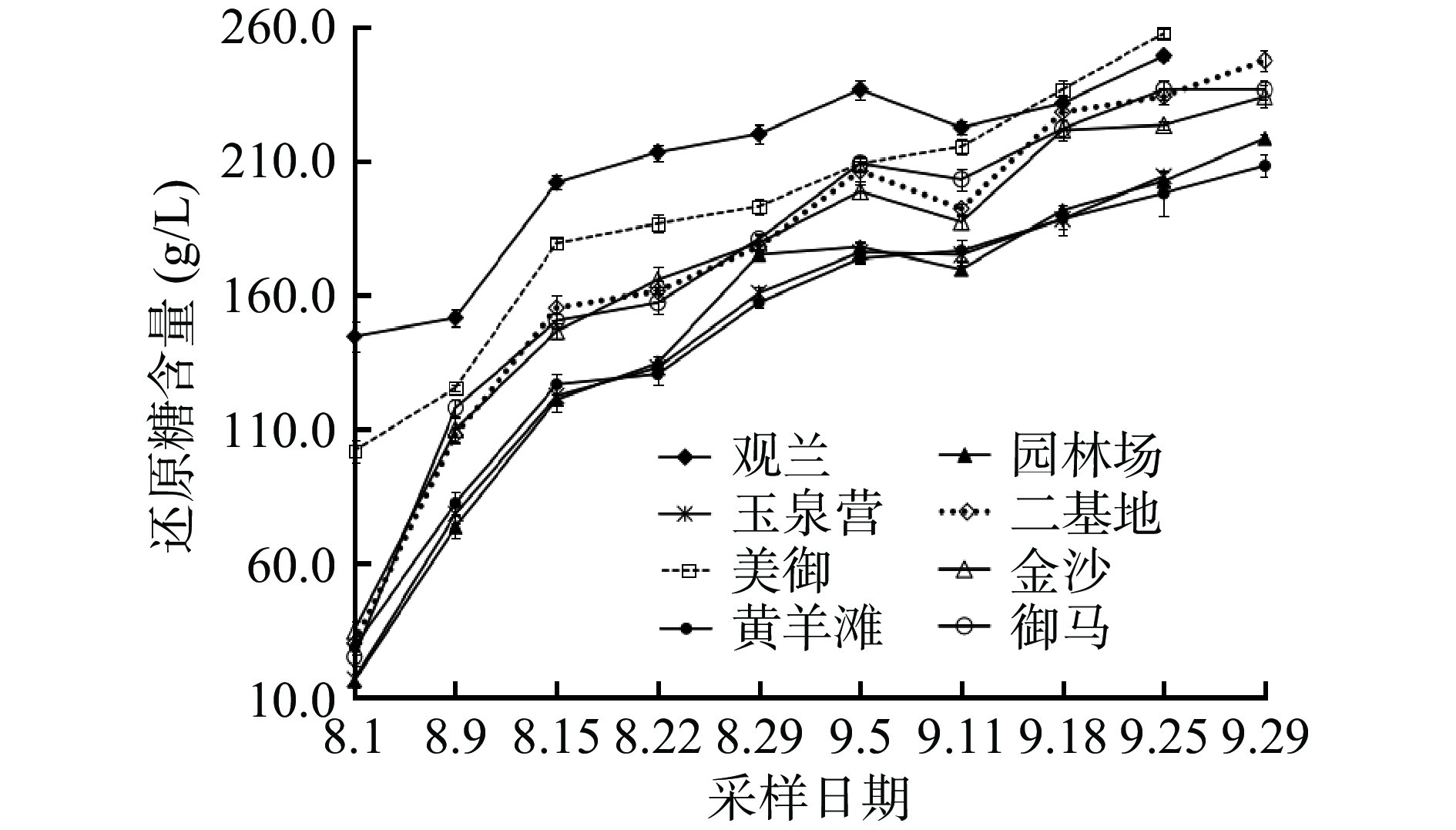
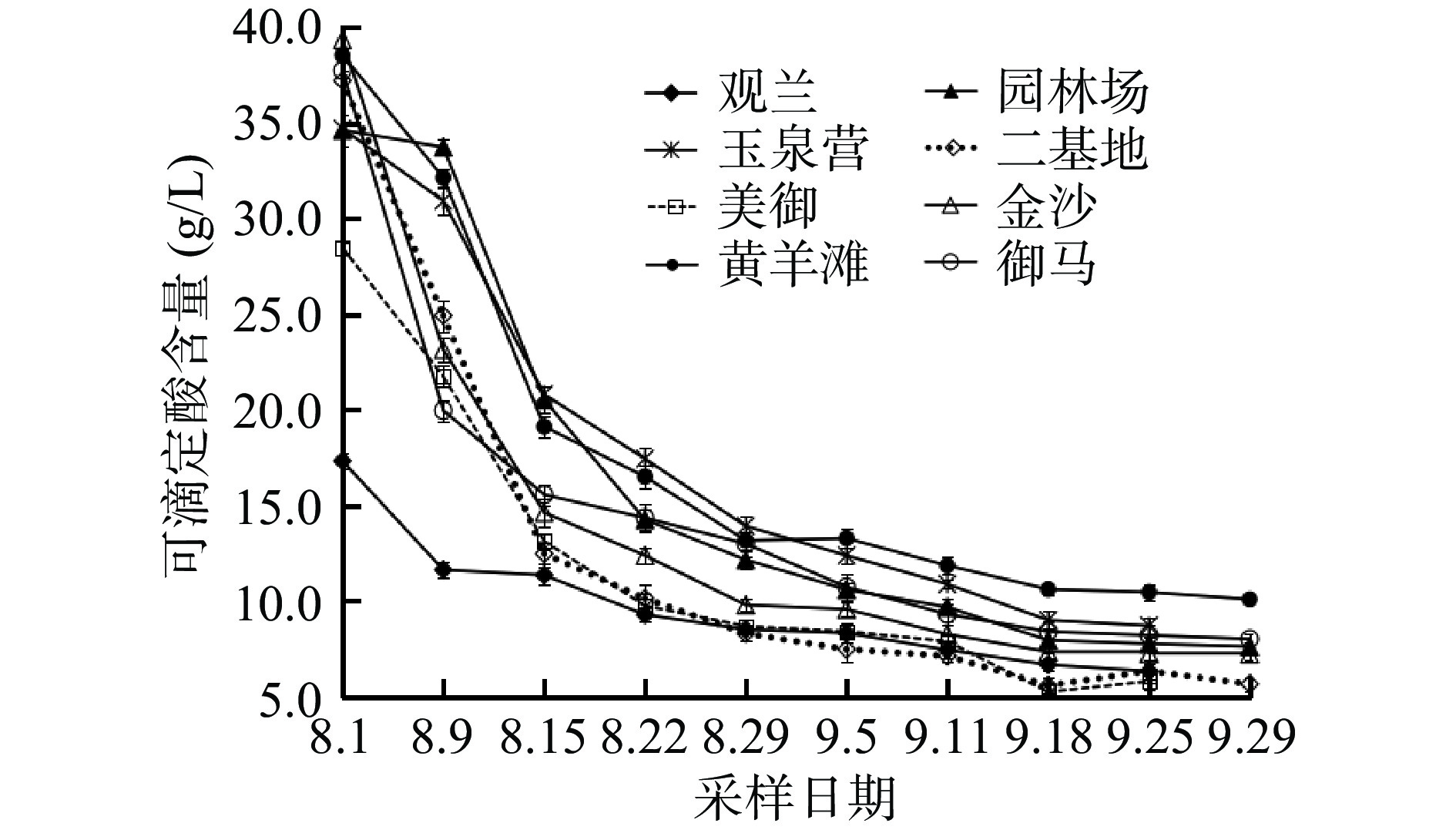
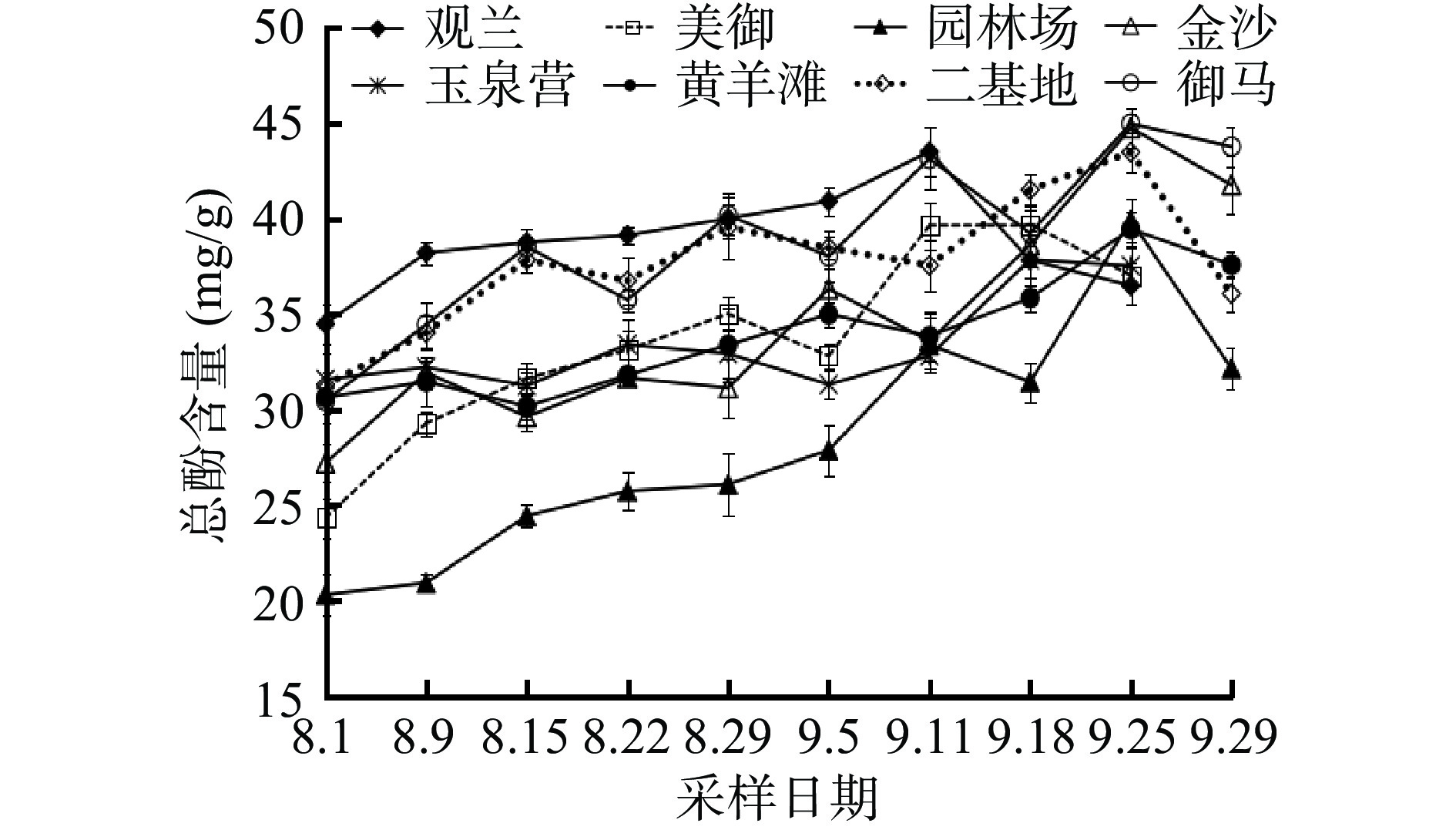
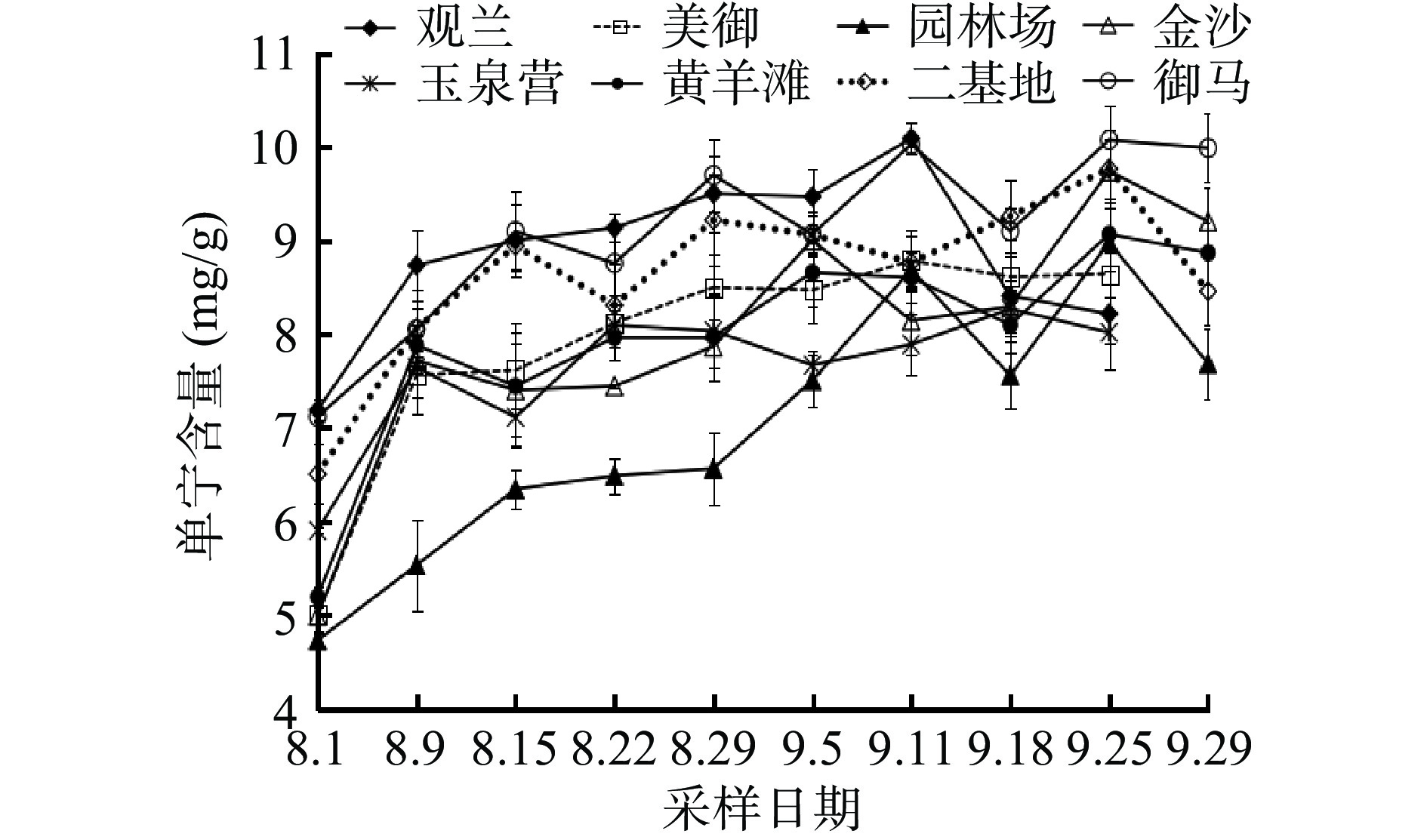
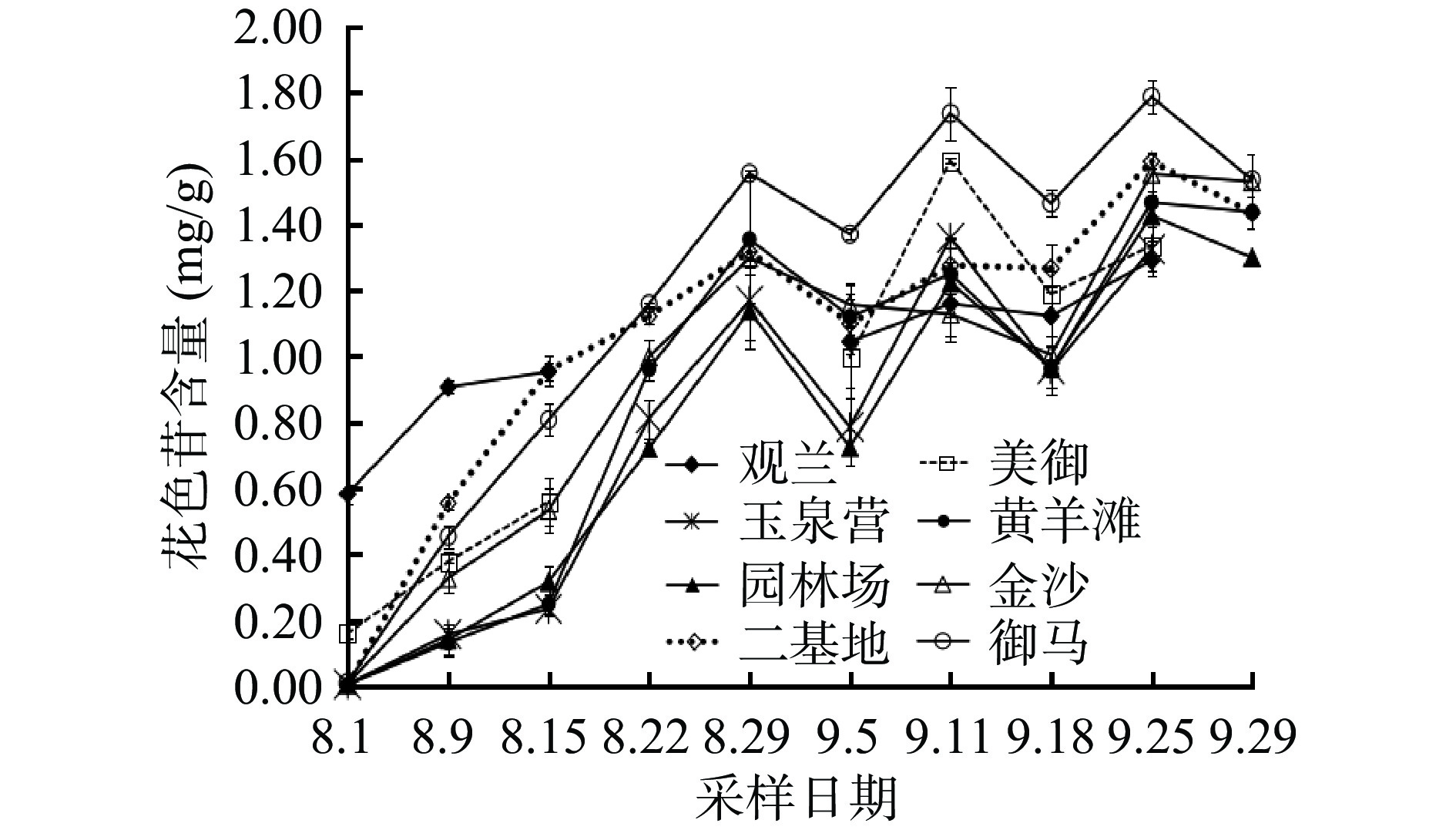
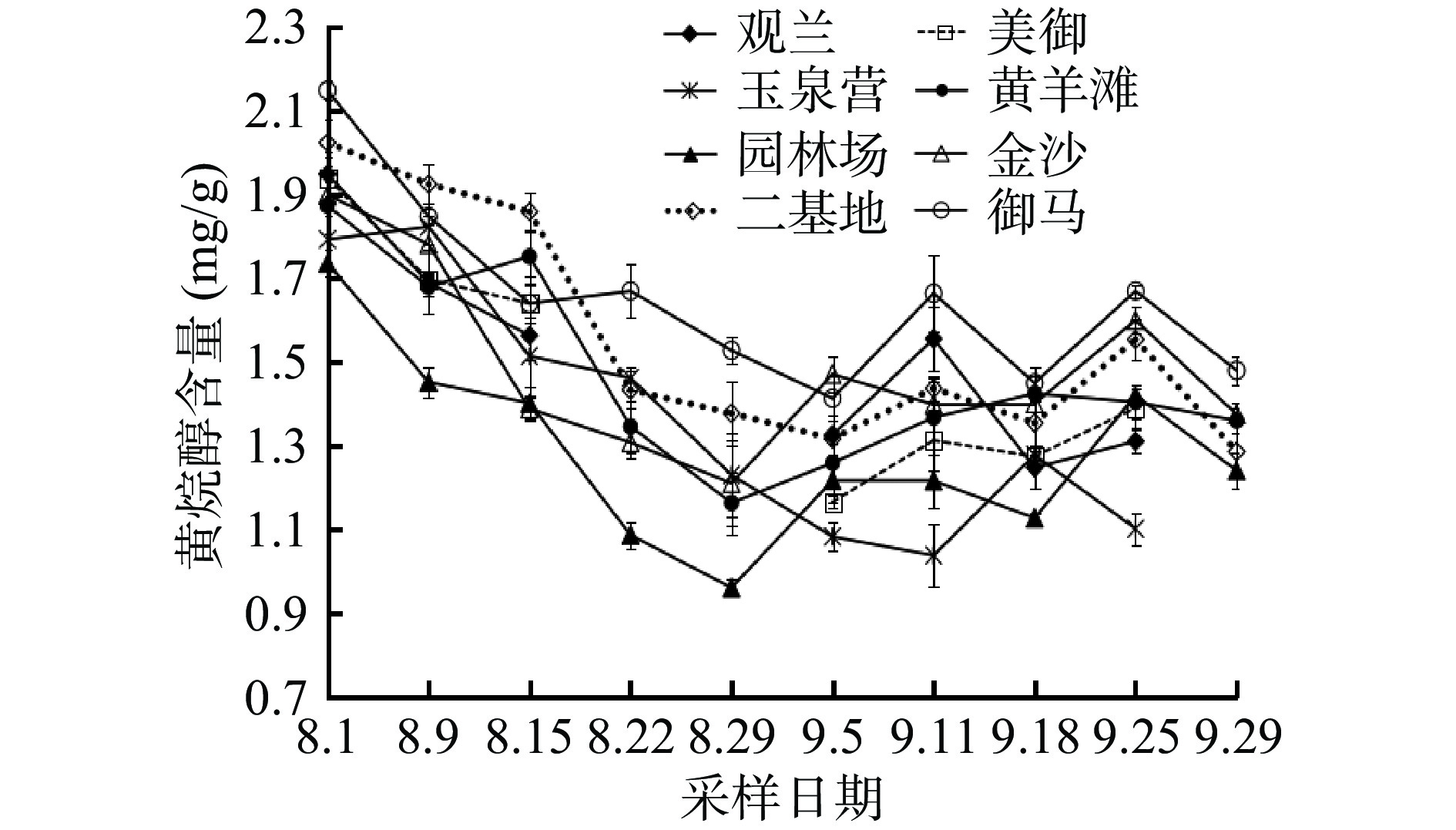
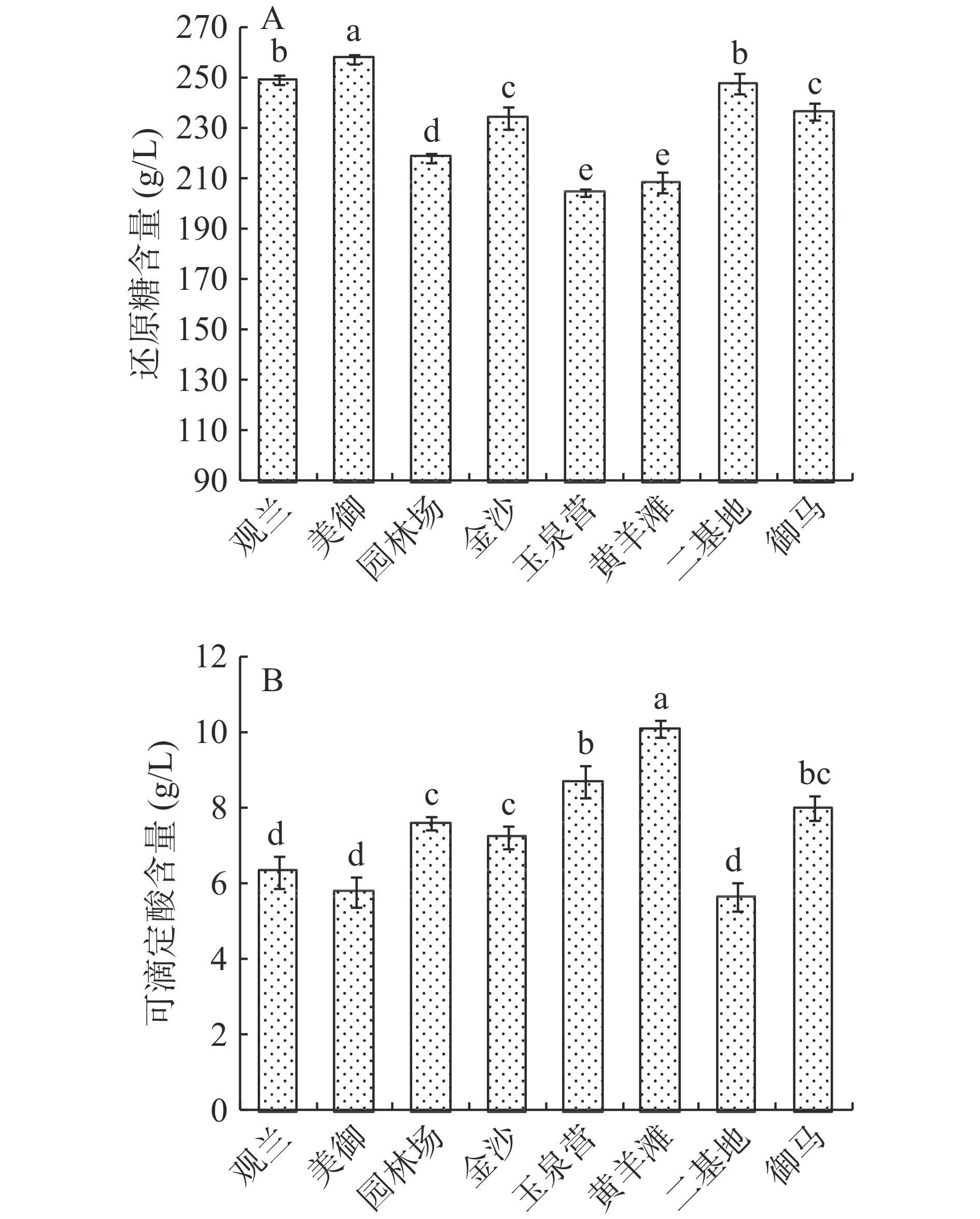

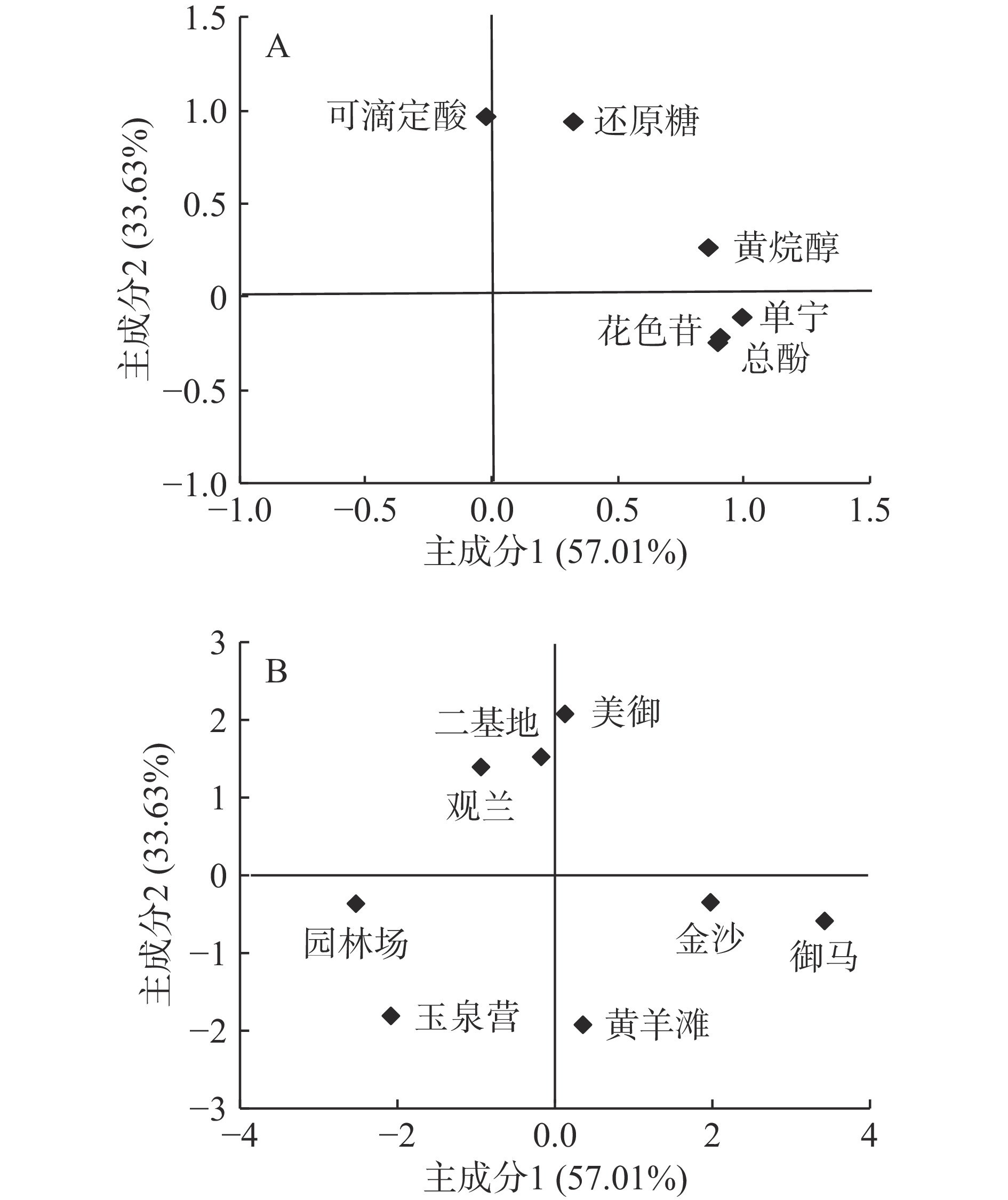
 下载:
下载:



